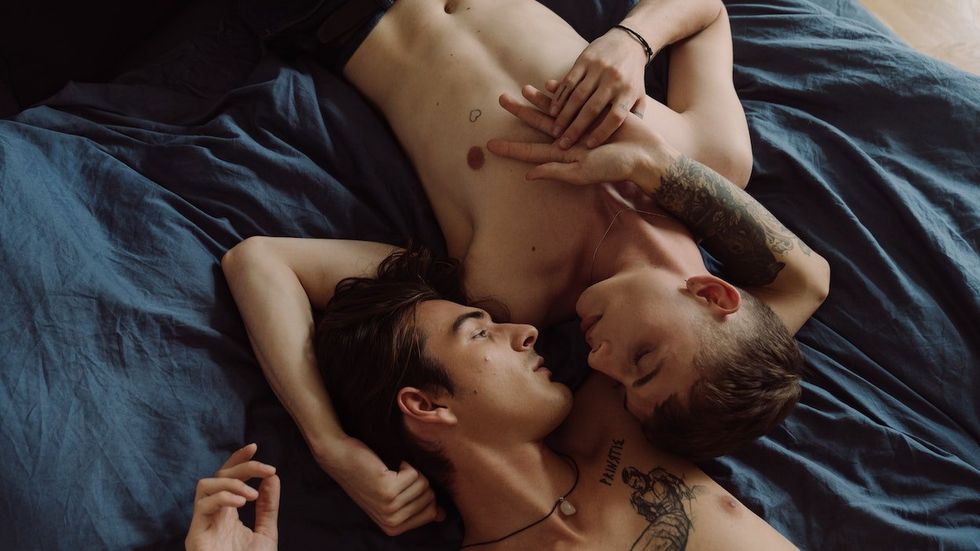It’s Saturday night at the Eagle Bar in New York City. The music is blaring. Shirtless men, some in leather harnesses, are spilling out of the bathroom. You make your way through the crowd, smelling sweat and the occasional whiff of poppers. In the corner to your left, a group of men are gathered groping, touching, groaning. No one is saying a word.
Queers have long pioneered ways to have sex that are radically different from the Hallmark movie storylines cherished by straight society. Kinksters invented safe words. Lesbians imagined the “pillow princess.” Gay men pioneered the bathhouse. And sex workers devised an array of tools to ensure workplace safety.
Many conservatives would clutch their pearls to hear about what happens at the Eagle most weekends. But increasingly, these kinds of queer sexual spaces are also under attack from the left.
The #MeToo movement ushered in an era of sexual reckoning — but mostly for straight people. Queers — and especially queer people of color — have mostly been left out of the conversation. It’s time we spoke up for ethical sex on our own terms.
After #MeToo, some suggested that consent must be much more explicit, arguing for the practice of “enthusiastic consent” — often described as asking your partner to literally say “yes” out loud before you do anything in bed.
Modeling enthusiastic consent in educational settings could be helpful to highlight the importance of checking in with your partners. But not everyone sees it that way. Some go further to equate any sex that doesn’t conform to the enthusiastic model as assault. Others take even more hardline stances, such as arguing that anyone who drinks a glass or two of wine isn’t able to give consent at all. That, too, is troubling, because it implies that many of us are being assaulted and committing assault on a regular basis — simultaneously making us all into victims and perpetrators.
That false equivalence trivializes real sexual violence by equating rape with what is for plenty of people, garden-variety sex. Like safe words, enthusiastic consent may be a useful tool for some people to practice consent. But it cannot be the yardstick we use to measure harm.
To be clear, communication is critical during sex. But herein lies another problem with the enthusiastic model becoming the new default: It assumes that sexual communication must be verbal. In practice, sexual communication is often nonverbal, a satisfied groan, a smile, a grabbing of flesh. Even if the men at the Eagle can’t hear each other over the thumping music, they can still be practicing consent.
Queer sexual and community spaces aren’t perfect. And they’re not for everyone. They can be places of violation, of unwanted touching and, yes, assault. Our institutions can and should do more to promote ethical sex. Not everyone enters a bathhouse knowing the rules of engagement. Not everyone comes to the gay bar to cruise for sexual partners. We must do more to educate first-timers on what to expect and work to establish norms in our spaces that are plainly defined for everyone. We also must do more to support victims of sexual violence in our communities.
When sexual violence does occur, how do we respond? Much of the #MeToo discussion has emphasized the need for more policing and prosecution. But the criminal justice system cannot solve the problem of sexual violence alone. As queers, we know that the law is not always our friend. Police often ignore us or, worse yet, commit acts of racist, sexist, transphobic, and/or homophobic violence against us. The majority of us will never find justice under the law. We need solutions built by us and for us — including solutions aimed at preventing assault before it happens, not just responding to its traumatic aftermath.
Hate makes change difficult. We live in a society that sees sex as taboo and queerness as wrong. Sexual violence thrives in silence, when people feel too ashamed to speak openly and honestly about sex.
Can we honestly expect queer people to be open and honest about sex today? When lawmakers are pushing LGBTQ book bans and “don’t say gay” laws? Or when they’re crafting legislation to ban and even criminalize gender-affirming care for transgender young people?
Sex education should be giving young people the tools they need to have tough conversations about sex and consent. But conservatives have waged a war to promote abstinence-only sex education programs that are proven to be a complete failure. Young people are sent into the bedroom without a clue or a condom.
Pleasure, let alone sexual competency, is completely left out of most sex ed curriculums. Just ask a straight woman how many of their male partners know how to find the clitoris. If straight men aren’t informed enough to pleasure their female partners, imagine how ill-equipped queer young people are about how to have sex — let alone pleasurable and ethical sex.
Unsafe Words: Queering Consent in the #MeToo Era, is the book we wish we had when we were growing up to fill in the massive gaps in our own sex education. Bringing together academics, sex workers, and activists, the 14 authors challenge the emerging conventional wisdoms about sex, consent, and harm invented by straight people.
Queers: Let’s talk about sex — and consent. On our own terms. Based on our unique community needs and perspectives. We cannot let straight people dictate what sex ought to look like for us.
Shantel Gabrieal Buggs and Trevor Hoppe are the editors of Unsafe Words: Queering Consent in the #MeToo Era.
Views expressed in The Advocate’s opinion articles are those of the writers and do not necessarily represent the views of The Advocate or our parent company, equalpride.




















































































